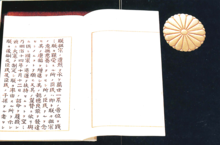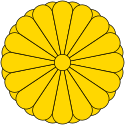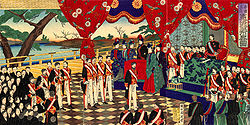This article includes a list of general references, but it lacks sufficient corresponding inline citations. (May 2010) |
| Constitution of the Empire of Japan | |
|---|---|
 Preamble of the Constitution | |
| Overview | |
| Original title | 大日本帝国憲法 (Dai-Nippon Teikoku Kenpō) |
| Jurisdiction | Empire of Japan |
| Created | February 11, 1889 (Meiji 22) |
| Presented | April 1888 |
| Date effective | November 29, 1890 |
| System | Unitary parliamentary semi-constitutional monarchy |
| Government structure | |
| Branches | Three |
| Head of state | The Emperor |
| Chambers | Bicameral (Imperial Diet: House of Representatives, House of Peers) |
| Executive | Cabinet, led by a Prime Minister |
| Judiciary | Supreme Court |
| Federalism | Unitary |
| Electoral college | No |
| History | |
| First legislature |
|
| First executive | 1885 |
| Repealed | May 3, 1947 |
| Amendments | 0 (no amendments) |
| Location | National Archives of Japan |
| Author(s) | Inoue Kowashi, Kaneko Kentarō, Itō Miyoji and Iwakura Tomomi, along with a number of foreign advisors |
| Signatories | Emperor Meiji on February 11, 1889 |
| Supersedes | Tokugawa Shogunate |
| Full text | |
| This article is part of a series on |
 |
|---|
|
|

The Constitution of the Empire of Japan (Kyūjitai: 大日本帝國憲法; Shinjitai: 大日本帝国憲法, romanized: Dai-Nippon Teikoku Kenpō), known informally as the Meiji Constitution (明治憲法, Meiji Kenpō), was the constitution of the Empire of Japan which was proclaimed on February 11, 1889, and remained in force between November 29, 1890, and May 2, 1947.[1] Enacted after the Meiji Restoration in 1868, it provided for a form of mixed constitutional and absolute monarchy, based jointly on the German and British models.[2] In theory, the Emperor of Japan governed the empire with the advice of his ministers; in practice, the Emperor was head of state but the Prime Minister was the actual head of government. Under the Meiji Constitution, the Prime Minister and his Cabinet were not necessarily chosen from the elected members of parliament.
During the Allied occupation of Japan, the Meiji Constitution was replaced with the "Postwar Constitution" on November 3, 1946; the latter document has been in force since May 3, 1947. In order to maintain legal continuity, the Postwar Constitution was enacted as an amendment to the Meiji Constitution.
- ^ "Meiji Constitution | 1889, Japan". Encyclopedia Britannica. Retrieved August 21, 2017.
- ^ Hein, Patrick (2009). How the Japanese became foreign to themselves : the impact of globalization on the private and public spheres in Japan. Berlin: Lit. p. 72. ISBN 978-3643100856.